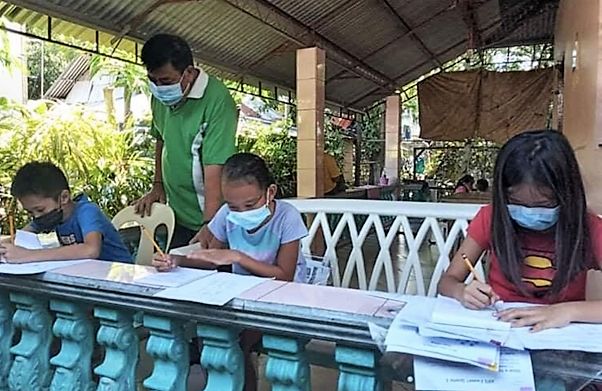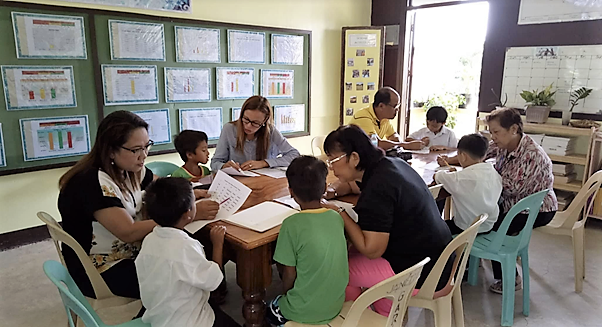
By Malio Aguilar
The struggle has been real for many students who were forced to learn remotely due to the COVID-19 pandemic. The worry is even bigger for parents like Josephine Billones, from Oton, Iloilo, whose young daughter Jhaeza had to start grade school outside a classroom.
With schools across the Philippines closed for more than a year now, the help that Jhaeza, who’s in Grade 1, gets from her teacher is minimal given the limited Internet access that her mother could afford. That also limits what she could learn at her grade level where reading is a key competency.
So the local government’s remedial reading program proved to be manna from heaven for both Jhaeza and her mother.
The program is called “Collaborative Action in Reading Instruction to Nurture Achievers”, or CARINA, named after the municipality’s first woman mayor, Carina Flores, who launched it more than a decade ago.
The program aims to boost the reading proficiency among grade school students and was carried out daily for an hour before the pandemic hit. As the global health crisis restricted movement and shuttered schools, teachers have been conducting the reading sessions with students virtually every Friday.
At the time the program was introduced, Oton had the lowest scores in the district in the National Achievement Test and there were a lot of slow and non readers so a plan was hatched to increase reading proficiency, said project coordinator Suzanne Basco.
“The most challenging part is making sure that the children pronounce the words properly,” said Rosalie Francisco, a Grade 1 teacher who is handling 15 students under the remedial reading program. “It is challenging but very rewarding.”
Francisco says what gives her a sense of fulfillment is “seeing the progress in the program participants from a non-reader to even a slow reader.”
Oton is among the more than 400 local government units that Synergeia Foundation works with to make sure that every child completes a good basic education and is given equal opportunities to become the best of what he/she can be.
“We transform their way of governance because local governments are closest to their constituents – they can listen, they can feel, they can understand what their constituents need,” Synergeia President and CEO Milwida Guevara said.
Honorable mention
In the current school year, Oton was able to reduce the number of its non and frustrated readers by 29.6%. The municipality made it to the list of honorable mentions for the annual Seal of Good Education Governance awarded by Synergeia and the United States Agency for International Development at the 14th Washington SyCip National Education Summit held in March.
Many partner communities of Synergeia hold remedial sessions to improve the reading competency of students. A key criterion in awarding the Seal is the reduction in the number of non and frustrated readers in the member cities and municipalities.

For students without steady Internet access, the teachers schedule home visits, usually done fortnightly, said Aylen Artuz, the principal of Rita Elementary School, who has been part of the reading project for four years monitoring the progress of the learners.
That puts the bulk of the burden in mentoring the children with their own parents so Artuz said they make sure to give the parents tips on how to help their child improve their reading skills.
“We tell them how they should read the stories to make them more interesting to the children,” she said. “Most parents have a hard time especially when their child is just beginning to read so we teach them how to be engaging and how to make the proper sounds in pronouncing the words.”
For Billones, the reading program is a huge help for her daughter and herself as it gives her time to work. She sells vegetables and fruits with her husband.
“The remedial sessions have been great because they help my child enunciate sounds and read words properly,” she said. “I can also work while she’s learning and just follow up with her later on.”




